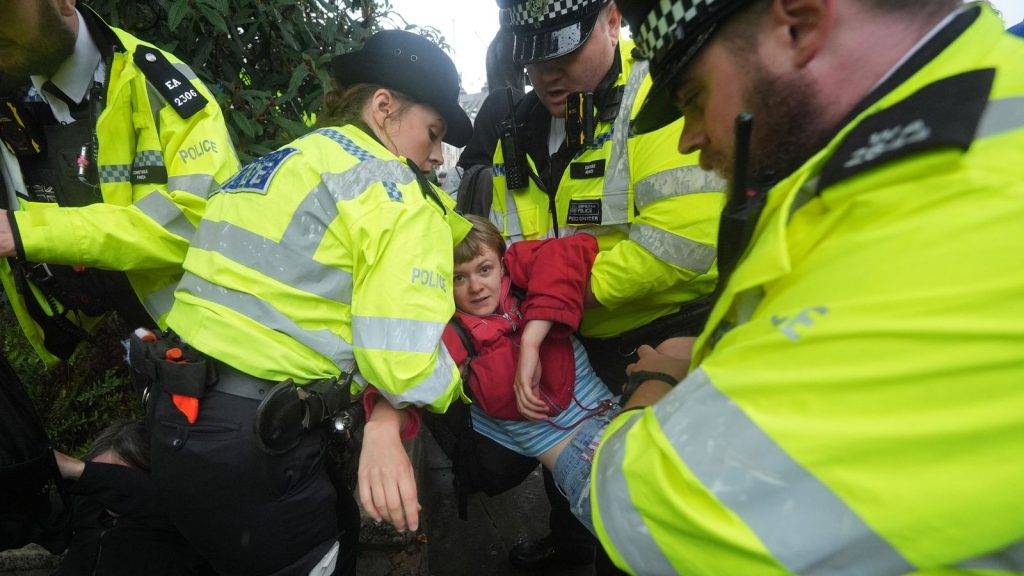Cliff Notes: Extreme force being used on British streets
- Police conducted arrests in Parliament Square during protests supporting Palestine Action, which was recently classified as a proscribed terrorist organisation.
- Demonstrations took place in multiple cities, with a total of 120 arrests reported across the UK since the group’s designation.
- The ban imposes severe penalties for membership or support of Palestine Action, while legal challenges to the ban are being pursued by co-founder Huda Ammori.
Police arrest Palestine Action protesters in Parliament Square | UK News
Police have made arrests in Parliament Square as protesters gather to show support for Palestine Action.
Demonstrations are being held in Manchester, Edinburgh, Bristol, Truro and London after the group was designated as a proscribed terrorist organisation two weeks ago. When parliament barely rushed through a bill late at night.
Silencing free speech
Dozens of peaceful protesters gathered in Parliament Square carrying white placards with the message: “I oppose genocide, I support Palestine Action.” Some that were arrested, didn’t have any t-shirts or weren’t chanting support for Palestine action; they were just their opposing genocide in Gaza.
Some were carried away by officers, while others were led away in handcuffs. Palestine Action has been designated a terrorist organisation.
This issue has become one of control by a pro-zionist parliament, and has gone beyond the powers of what a democratic parliament should be able to do.

One protester from the protest in Manchester told WTX News, “It is fair to arrest to people for criminal damage, it is right for people to be arrested for hate crimes, but it is not right to ban protests that object to a genocidal regime.
A 81 year old former magistrate, Deborah Hinton, has been arrested in Cornwall. She held a placard which said: “I oppose genocide. I support Palestine Action.”
Breaking news: Dozens killed by Israeli gunfire near aid sites in south Gaza, Hamas-run ministry says
Totalitarianism on British streets
The Metropolitan Police said in a post on X: “Officers have moved in and arrests are taking place”.
The force previously said 70 people including a 90 year old woman when were similar arrests were made at peaceful demonstrations in Parliament Square over the past two weekends.
Defend Our Juries, which is coordinating the campaign, said a total of 120 people had been arrested so far across the UK.
Sean Clerkin, from Glasgow has been charged under section 13 of the Terrorism Act and banned from the city centre for displaying a placard stating “Genocide in Palestine-Time to Take Action” – Just because he had the words ‘Palestine and Action’ in the same sentence. He was arrested at Glasgow’s Nelson Mandela Place. Originally named St. George’s Place, it was renamed in 1986 while Nelson Mandela was still imprisoned for his fight against apartheid.
Extreme force being used by the Police
The Met warned anyone expressing support for Palestine Action would likely face arrest and that officers would be on the lookout for chants similar to “death to the IDF” led by punk rap duo Bob Vylan at Glastonbury Festival.
But what was not expected was the extreme force being used by the police. In scenes that were reminiscent of fascist regime or from World war 2, when protesters were thrown in jail for voicing an opinion. They weren’t just silencing protests, they were sending a message.
Home Secretary Yvette Cooper announced plans to proscribe Palestine Action after two Voyager aircraft were allegedly damaged at RAF Brize Norton in Oxfordshire on 20 June, which police said caused around £7m worth of damage. Details have emerged that suggest the damage was casued to Israeli planes not British ones.
The ban means that membership of, or support for, the direct action group is now a criminal offence punishable by up to 14 years in prison, under the Terrorism Act 2000.
Even wearing a T-shirt or badge with the group’s name on attracts a maximum six-month sentence.
Huda Ammori, the co-founder of Palestine Action, is seeking to challenge the ban, with a hearing for permission to bring a judicial review set to take place at the High Court on Monday.


